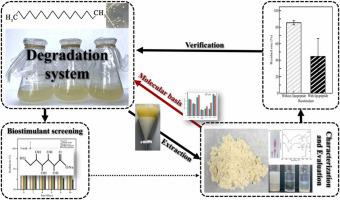Journal of Environmental Chemical Engineering ( IF 7.4 ) Pub Date : 2022-08-01 , DOI: 10.1016/j.jece.2022.108382 Hantao Su , Xiaoxian Kuang , Yuan Ren , Lixin Luo

|
Adding biostimulants is an effective means to improve the degradation efficiency of refractory organics such as petroleum hydrocarbons, and the mechanisms of biostimulants varies from their types. In this study, n-hexadecane was used as the target pollutant to explore the effects of different kinds of biostimulants on the degradation ability of Raoultella planticola. The results showed that sodium gluconate had the most remarkable enhanced effect with an increase of 241.7% within 10 days. Moreover, R. planticola was stimulated by sodium gluconate to secrete biosurfactants and it was confirmed as a non-ionic lipopeptide by structural characterization. Most biosurfactants existed in intracellular and the emulsion index E180 was 58.33%. The addition of the extracted biosurfactants as a biostimulant was validated and found to increase the degradation rate by 341.2% within 6 days. RNA sequencing (RNA-seq) and real-time quantitative PCR (RT-qPCR) were used to reveal the molecular basis of biosurfactants secretion and the results showed the up-regulation of genes for fatty acid and lipopeptide synthesis with the addition of sodium gluconate. In conclusion, this paper demonstrates that sodium citrate, seignette salt, sodium succinate and sodium gluconate all had a good enhanced effect on R. planticola, and first reported that the promoting effect of sodium gluconate was mainly accomplished by stimulating R. planticola to produce biosurfactants. Direct use of inexpensive biostimulants to stimulate indigenous microorganisms to improve their degradation ability provides an economical idea for the remediation of petroleum hydrocarbon pollution, which will have great application prospects.
中文翻译:

生物刺激素促进植物拉乌尔菌对正十六烷的生物降解:脂肽生物表面活性剂的产生
添加生物刺激剂是提高石油烃等难降解有机物降解效率的有效手段,而生物刺激剂的作用机制因种类而异。本研究以正十六烷为目标污染物,探讨不同种类的生物刺激剂对植物拉乌尔菌降解能力的影响。结果表明,葡萄糖酸钠的增强效果最为显着,10天内增加了241.7%。此外,R. planticola受葡萄糖酸钠刺激分泌生物表面活性剂,结构表征证实其为非离子型脂肽。大多数生物表面活性剂存在于细胞内,乳液指数 E 180为 58.33%。添加提取的生物表面活性剂作为生物刺激剂经过验证,发现在 6 天内可将降解率提高 341.2%。使用 RNA 测序 (RNA-seq) 和实时定量 PCR (RT-qPCR) 揭示生物表面活性剂分泌的分子基础,结果显示添加葡萄糖酸钠可上调脂肪酸和脂肽合成基因. 综上所述,本文论证了柠檬酸钠、西格奈特盐、琥珀酸钠和葡萄糖酸钠均对R. planticola有良好的促进作用,并首次报道了葡萄糖酸钠的促进作用主要是通过刺激R. planticola来实现的。生产生物表面活性剂。直接使用廉价的生物刺激剂刺激土生微生物提高其降解能力,为石油烃污染的修复提供了一种经济的思路,具有很大的应用前景。











































 京公网安备 11010802027423号
京公网安备 11010802027423号